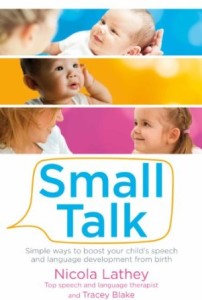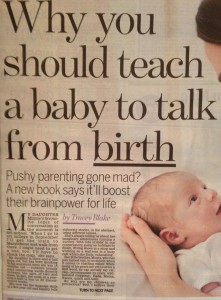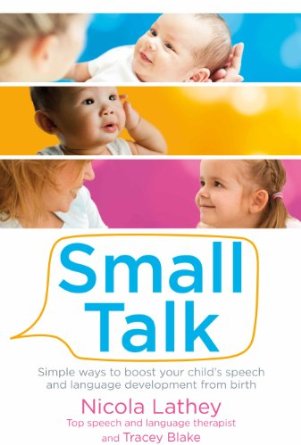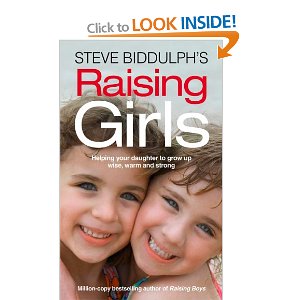 Author Tracey Blake sounds like the sort of over-suffocating, helicopter-type of parent ‘my child is so brilliant/amazing/cleverer than yours’ that somehow I always got stuck next to at awful school evenings.
Author Tracey Blake sounds like the sort of over-suffocating, helicopter-type of parent ‘my child is so brilliant/amazing/cleverer than yours’ that somehow I always got stuck next to at awful school evenings.
The co-author of a new book, Small Talk, which aims to ‘teach’ parents how to speak to their kids, in a recent article in the Daily Mail, she writes: “My daughter’s favourite topic of conversation at the moment is art school. ‘When I go to art college in September I’ll get the train from Marylebone and walk from there. I might need to get a bus, too. I’ll have to check the map,’ she says”.
So is her daughter – who already sounds a crashing bore if that’s truly the way she always speaks – 18 years old perhaps? No – of course not – this clever little soul is just three and Tracey gushes, “now has the language skills of a five-year-old and happily tells elaborate stories, in the abstract using different tenses.”
This apparently is not due to daughter Minnie’s amazing intellect (although one can assume she must have a high IQ presumably inherited from her parents…) but down to Tracey’s fabulous parenting skills. You see while most mums feel lucky if in their frazzled lives they manage to find time to read their kids a bedtime story, Tracey who also has son Monty (he is just one but she boasts can already say numerous words too) has been teaching them to speak from birth.
And now Tracey – who says she was first given this idea by her friend and co-author speech therapist Nicola Lathey – has written a book listing sets of exhausting verbal exercises you must do with your children.

Her list recently appeared with her article publicising her book in the Daily Mail – and is so glaringly obvious that I can’t comprehend why anyone would actually pay £12.99 (or £8.31 if ordered on Amazon) to read it. Such gems as speak clearly, say what you see, repeat words and talk sense (not dadda boo boo honey pot baby etc).
The problem I have with this sort of book is this. While Tracey says research claims 33 per cent of children start school without the necessary verbal skills, they are unlikely to be the sort of mums reading this article, and wanting to do the best for the kids (so contemplating buying a book).
The truly neglectful parent just isn’t going to be reading all of this anyway – and incidentally routine health checks should be picking those children up and then their parents should be given professional and individual advice. There is also no guarantee doing all this with your child will work. Well, to clarify, even if your kids do talk earlier, there is no guarantee they will turn into the sort of adult you hope or have a happier life because of it (and there is the danger all this cajoling to speak early could make your kids unhappier…)
As a mum of three I can only remember too well just how much pressure this sort of book – and the sort of competitive parent Tracey appears to be – put on me as a parent.
If only I’d known then what I know now! For example, one of my children barely uttered a word until he was three. If my memory serves me correctly he didn’t walk either until he was 18 months old. So fast forward to now and he is in his 20s. So what’s happened? Well, he graduated with a 2:1 in psychology, did a gap year with me (writing and interviewing…) where interviewees and editors alike absolutely adored him (and he was offered a traineeship with a national newspaper) and then he beat hundreds of other candidates to eschew journalism and work in the City. Oh, and he plays sport at a semi-professional level…
My youngest child – and with two boisterous brothers and a full time job to hold down working as a writer from home, I always felt I never had enough time to properly devote to her – was talking in sentences by nine months (yes even earlier than Tracey’s daughter!!) But, while yes I admit I was so proud (although I was puzzled as to why she spoke so early and no idea now why) frankly there is no difference in either conversation or achievements between her and both her brothers now.
Tracey says “I’m not suggesting you become the pushy mother from hell and turn your baby’s early months of life into one long hot-housing education exercise” but if this isn’t hot-housing what is? And where as a parent do you hope such home education will lead to? Your daughter going to Oxbridge and freezing her eggs?
Unfortunately as a parent – and wanting to do my best – I often tried these things I read in parenting articles. Ironically when my kids were young, I was a writer for all the baby and children magazines so was always being sent something or other about how to be a better parent. But my own good intentions usually quickly fell by the wayside.
As my children say now, there is an awful lot of video footage of them as kids running riot in the garden, pinging plums at one another and stoking bonfires (yes I know I was lucky they were ok) and in the background, there was me. Usually I was blissfully oblivious of the chaos around me – generally seen engrossed in a newspaper (and not much has changed…)
However, seeing how my kids have turned out, I’m just so glad I never bought any of these sorts of books. I also gave the sort of parent who likes to compare their (brighter they think) child with yours a wide berth and I suggest if you are a new parent you follow your instincts and, for the sake of your children and your own sanity, you do the same.
Small Talk by Nicola Lathey and Tracey Blake is published by MacMillan.




I read the following article on the book’s website (www.smalltalktime.com). Hopefully will add another side to the debate:
At Small Talk Towers, we’ve been asked many times what the book is about. We’ve also been asked whether parents really need a book on speech and language development given that most children end up talking anyway.
To answer these questions, I always introduce two metaphors. Firstly, the metaphor of the ‘archaeologist’ . Small Talk provides an ‘archaeology’ of speech and language. Just as an archaeologist digs deep into the earth to uncover hidden layers and objects, so too does Small Talk uncover and clearly identify the (often) hidden stages and foundations upon which speech and language are built. Adults take these various foundations for granted. But to a baby who is born into a world where nothing is known and everything is new; and who doesn’t possess any language but only the capacity for language; these stages are initially challenges which need to be overcome.
Identifying the ‘archaeological’ foundations of speech and language is an interesting exercise in itself. But the purpose of Small Talk is not only to show parents how to recognise which stage their child is at, but to show them how to help their child develop through these various stages. Here, I introduce the metaphor of the ‘gardener’. For just as a good gardener provides the right conditions and employs the best techniques to nurture his plants so that they flourish and grow, so too does Small Talk inform parents of the right conditions and best techniques to use in order to help their child master each developmental stage most efficiently and effectively.
Of course, different children have different developmental potentials, and will possibly master each stage at different speeds. But whatever your child’s potential, Small Talk provides you with the tools and knowledge to make that developmental process as smooth and frustration-free as possible. And which parent wouldn’t want fewer tantrums in their life? At Small Talk Towers, we certainly value a tantrum-free existence!
PS It says that the book isn’t out until 20th June. You may have jumped the gun with your review!
I’ve pre-ordered a copy of Small Talk for my daughter who is 8 months pregnant, but haven’t yet received it as it’s not out until Thursday. But I’m heartened by this review from a New Zealand newspaper which interviewed speech therapists / speech science academics who endorse the book’s recommendations. I hope the person who wrote the article above opens her mind to this endorsement:
http://www.nzherald.co.nz/lifestyle/news/article.cfm?c_id=6&objectid=10891200
Hello Mary. I am sure some parents will love this book and it is just my view. I find it a shame that you are already buying a book to try to get your daughter’s baby to talk early – and he or she isn’t even born yet!! What pressure to put on your own daughter, who should surely be left to simply enjoy her baby. My own daughter was talking extremely early – with no intervention from me! If children are brought up in a loving home – ideally with a parent at home (and I was lucky as a writer to have always worked from home) – there is no need to ‘bring your children on’ like this. They will develop at their own pace. And as I found – there is no difference now between my daughter who was chatting at 9 months, my first son who said the usual words around a year and my other son who hardly said anything. They have all gone to university and come out with good degrees. They also have wonderful childhood memories of being left alone to play. Incidentally the reason I wrote this piece was because most parents worry enough about whether they are ‘good enough’, let alone feeling a failure because they aren’t getting their kids to speak early! However, for those who are interested I am sure they will find the link you have put on useful.
Thanks for your reply. I have to say that I haven’t bought the book for my daughter so that she can fast-track her child and thereby miss out on the joys of childhood. Absolutely not! I have bought it because I believe the book has tips and techniques which are grounded in speech science, and, if used by a parent, can help reduce the frustration felt by a baby when there is a discrepancy between her understanding and her communication or language levels. I certainly don’t expect the book to guarantee my child a place in Oxbridge or a Nobel Prize! It can’t alter natural ability, but I hope it can help parents to bring out that potential as smoothly as possible.
I know some great speech therapists (I work in the health care profession) who have tools and techniques at their disposal, which work wonders with kids. I hope this book will share those tools with the lay person so that we can all better understand how our children are developing and what we can do to make that developmental process run as well as possible.
Does this make sense? It’s not about being pushy or competitive. I believe that professionals (if they are good) can help us develop the way we interact with our children. I have now received my copy of Small Talk, and I look forward to finding out if this book can do just that!